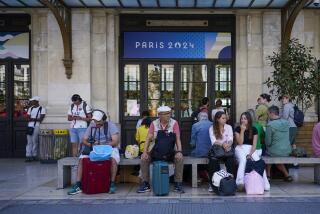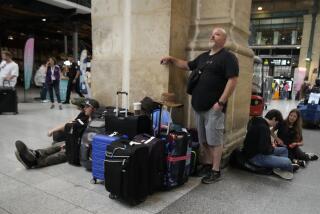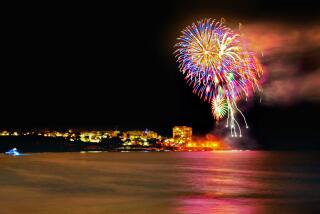Deadly explosions throw Boston Marathon into chaos
BOSTON — Two crude but deadly bombs ripped through crowds at the Boston Marathon on Monday, turning the finish line into a scene of chaos and carnage, killing 3, injuring at least 140 and closing down parts of central Boston.
The back-to-back explosions near Copley Square detonated near packed grandstands, severing limbs and causing serious shrapnel injuries to scores of spectators and others. Half a million people had gathered for the marathon, which drew runners from 50 nations.
A large area was cordoned off near some of the city’s best-known landmarks, including the Boston Public Library and Prudential Tower. Police armed with assault rifles set up security posts outside hospitals where the wounded were streaming in.
“This was a very powerful blast. There were serious, serious injuries,” said Boston Police Commissioner Edward Davis. “This cowardly act will not be taken in stride. We will turn every rock over to find the people who are responsible for this.”
There was no immediate indication whether investigators suspected a domestic or international terrorist plot. A federal law enforcement official said authorities were seeking a Penske rental truck seen leaving the race site.
“There was nothing, nothing on the radar screen” in terms of a terrorist threat, a U.S. Homeland Security official said.
Planes at Logan International Airport were briefly held on the ground and a no-fly zone was established over the city as authorities attempted to clarify the extent of the attack.
In an address, President Obama, who did not use the word “terror,” pledged the full resources of the federal government to aid the victims and identify the perpetrators. He said security across the U.S. would be stepped up as necessary.
“We still do not know who did this or why,” he said. “But make no mistake — we will get to the bottom of this. And we will find out who did this. We’ll find out why they did this. Any responsible individuals, any responsible groups will feel the full weight of justice.”
The explosions occurred at 2:42 p.m., five hours into the race and about two hours after the first runners had crossed the finish line.
The first blast sent a burst of red flames into the air, followed by clouds of white smoke and shards of debris that rose up to three stories high near the photo bridge that marks the finish line on Boylston Street.
The second explosion occurred about 13 seconds later, about 100 yards away.
Federal authorities said it was not known whether the devices were detonated remotely. Both bombs appeared to be unsophisticated and did not include plastic explosives, one federal official familiar with the investigation said.
An official from the federal Bureau of Alcohol, Tobacco, Firearms and Explosives said two additional devices were found nearby and dismantled. There was brief confusion when a fire was reported at the John F. Kennedy Library, but officials said later it was not related to the bombings.
At a press conference Monday night, officials would not comment on any additional devices.
WBZ-TV reported late Monday that law enforcement officers were searching an apartment in the Boston suburb of Revere. Massachusetts State Police confirmed to the Associated Press that a search warrant related to the investigation was served in Revere, but provided no further details.
When the explosions happened, at least one runner near the finish line fell to the ground. Some spectators ran screaming from the scene while others rushed to aid victims.
“There was a lot of screaming, people running away. I mean, people were running like animals,” said Chuck Wagner, a 59-year-old retired SWAT officer from Oceanside. He was waiting for his son to cross the finish line when the first blast went off about 60 feet away.
“You could smell explosives, so I knew right away it was not electrical,” he said. “I mean, when that thing went off, I knew exactly what happened.”
“There was blood all over Boylston. And shattered glass everywhere,” said Maya Hauer, 23, who was two doors down from the first explosion.
Police spun their fingers in the air, directing runners and onlookers to flee. A race volunteer who declined to give his name said he rushed to help police rip apart metal barriers blocking access to the street as victims lay on the sidewalk on the other side.
“They were bleeding, injured, yelling,” he said. “Mayhem is a good word. Mayhem, chaos, all those words apply.”
Medical tents that had been set up to aid ailing runners became triage centers, with as many as 50 people seeking treatment in one of them.
“It was definitely chaos,” said Rick Bowles, a doctor in training for general surgery who grabbed his coat, medical shears and ID and rushed from his apartment when he heard the explosions.
Monday was Patriots Day in Massachusetts , when the city bursts to life with a Red Sox home game and the world-renowned marathon. Patriots Day is a state holiday commemorating the battles that launched the beginning of the American Revolution.
“This is the day Boston shines in the spotlight, and that puts this event in the spotlight,” said Northeastern University criminologist James Alan Fox, who was a block away when the bombs exploded. “If it happened in another day, sure, it would have had an impact, but not quite the same. This will be remembered every Patriots Day.”
Patients were taken to at least seven hospitals, where at least 140 were being treated for injuries, including eight children. At least 17 patients were in critical condition and 25 more suffered severe injuries.
The hospitals remained on heightened security. An armored SWAT vehicle remained parked outside Brigham and Women’s Hospital.
Among the injured at Boston Children’s Hospital: a 2-year-old boy in intensive care with a head injury, and several other children ranging in age from 7 to 14 with leg and head wounds.
Most patients had injuries to their lower extremities from what appeared to be a low-level blast, physicians said.
Dr. Peter Fagenholz, a trauma surgeon at Massachusetts General Hospital, said he operated on six patients, including several whose limbs were amputated. Others suffered bone, soft tissue and vascular injuries, he said.
Residents streamed out of their homes and offices and offered cellphones to dazed runners, but with service jammed in the hour or so after the attack, many resorted to texting. Spectators wandered around holding their cheering signs aloft in a desperate attempt to find missing runners.
Joanna Humphrey had become separated from her mother, Pam, before the blast, when she ran back into a marathon party to retrieve her scarf. She heard the explosion from inside the Mandarin Hotel. As she rushed to the plate-glass windows to peer at the white smoke swirling outside, all she could think about was her mother. She ran outside.
“I was screaming her name, trying to call her by phone,” she said. “It’s one of those things like watching a movie. People were running in all directions. I was pushing people to the side, going down side roads and alleys.”
Pam Humphrey said she was standing 30 feet from where the second bomb went off.
“It was a big, huge pop,” she said. She braced herself against a parking garage wall and scanned the street for her daughter among the crowds of people who were fleeing into restaurants for safety.
Eventually, she spotted her. The two ran toward each other and embraced, and Joanna began heading toward the scene of the explosion before her mother wrapped her arm around her and steered her in the other direction.
“No. We are walking away from Boylston,” she told her daughter. “We are going to walk away from here.”
Semuels and Tangel reported from Boston; Serrano from Washington
Times staff writer Kim Murphy contributed to this report.
More to Read
Sign up for Essential California
The most important California stories and recommendations in your inbox every morning.
You may occasionally receive promotional content from the Los Angeles Times.












